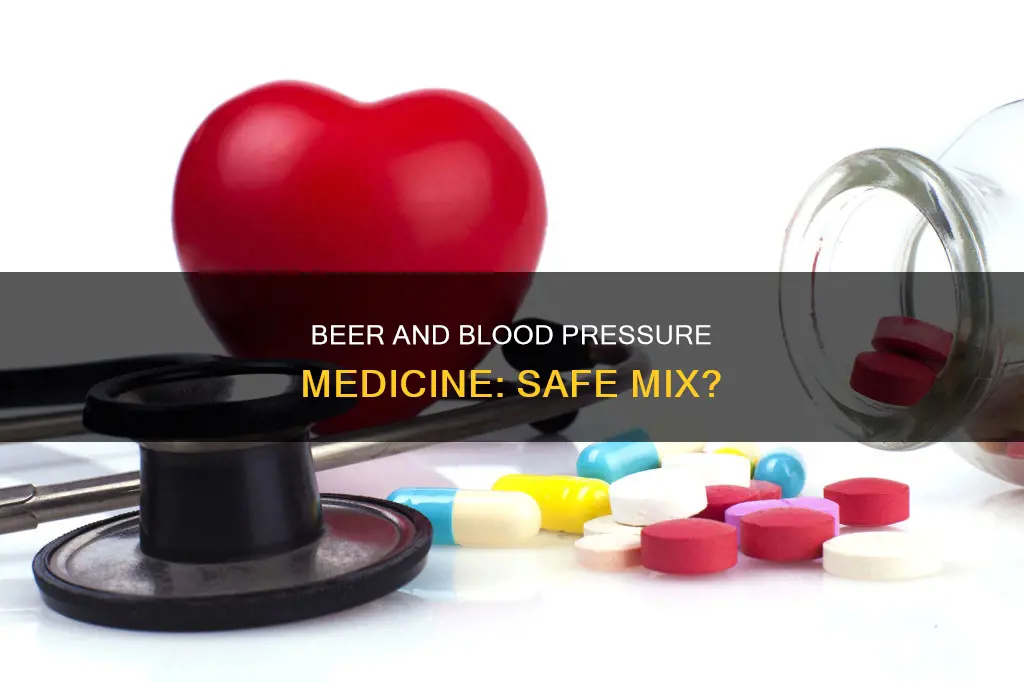
Drinking alcohol while taking blood pressure medication can be dangerous. Alcohol can cause high blood pressure, and mixing it with blood pressure medication can lead to orthostatic hypotension, or low blood pressure when going from sitting or lying down to standing up. This can result in dizziness, lightheadedness, drowsiness, fainting, and an increased risk of falls and injuries. Alcohol can also affect how medications work in the body by altering drug levels in the bloodstream, making side effects worse and reducing the effectiveness of the medicine. Therefore, it is generally recommended to avoid alcohol while taking blood pressure medication.
| Characteristics | Values |
|---|---|
| Can drinking alcohol cause high blood pressure? | Yes |
| Can drinking alcohol while taking blood pressure medication be harmful? | Yes, it can cause dizziness, drowsiness, fainting, low blood pressure, heart rhythm problems, etc. |
| What should you do if you want to drink alcohol while taking blood pressure medication? | Consult your doctor or healthcare provider. |
| What is the recommended alcohol intake limit for people with high blood pressure? | No more than two drinks per day for men and one drink per day for women. |
What You'll Learn
- Alcohol can cause high blood pressure
- Alcohol may affect the effectiveness of blood pressure medication
- Drinking alcohol with blood pressure medication can cause dizziness and drowsiness
- Alcohol may increase the effects of blood pressure medication
- It is recommended to consult a doctor about drinking alcohol with blood pressure medication

Alcohol can cause high blood pressure
Drinking alcohol while on blood pressure medication can lead to a range of side effects, including dizziness, a fast heart rate, fainting, drowsiness, and low blood pressure. However, alcohol consumption, even without the interaction of medication, can also cause high blood pressure. Excessive alcohol intake is associated with raised systolic and diastolic blood pressure in both men and women. This effect is predominantly due to alcohol consumed in the few days immediately before the blood pressure measurement, with alcohol consumed prior to those few days having little effect.
The American Heart Association recommends limiting alcohol consumption to no more than two drinks per day for men and one drink per day for women. A drink is typically defined as 12 ounces of beer (5% alcohol), 8 ounces of malt liquor (7% alcohol), a 5-ounce glass of wine (12% alcohol), or 1.5 ounces of 80-proof liquor.
While some studies suggest that small amounts of red wine may be linked to improved heart health, this may be due to lifestyle factors rather than the alcohol itself. As with any dietary or lifestyle choice, moderation is key.
If you are struggling to cut back on alcohol, it is important to seek help. Many people face similar challenges with alcohol, and getting help is easier than you may think. Consult your healthcare provider for guidance on managing your alcohol consumption and maintaining healthy blood pressure levels.
Fitbit Beers: Compatible with Pixel 2?
You may want to see also

Alcohol may affect the effectiveness of blood pressure medication
The combination of alcohol and blood pressure medication can also cause orthostatic hypotension, which is a sudden drop in blood pressure when standing up from a sitting or lying down position. This can lead to dizziness, lightheadedness, and fainting.
Additionally, alcohol can affect liver enzymes, altering the levels of medication in the bloodstream. This can either worsen the side effects of the medication or reduce its effectiveness. For example, when alcohol is combined with verapamil, a type of calcium channel blocker, it can increase blood alcohol levels and enhance the intoxicating effect.
Drinking alcohol can also indirectly lead to high blood pressure by contributing to weight gain. Excessive alcohol consumption is associated with raised blood pressure, which may make blood pressure medications less effective. Therefore, it is generally recommended to limit alcohol intake to manage high blood pressure effectively.
Centrifugal Force: Spinning Beer to Perfection
You may want to see also

Drinking alcohol with blood pressure medication can cause dizziness and drowsiness
Drinking alcohol while taking blood pressure medication can be dangerous. Alcohol can interact with certain drugs and worsen the side effects of the medication.
Mixing alcohol with blood pressure medication can cause dizziness, drowsiness, and fainting. These side effects can make you more likely to have an accident or fall, which may result in a serious injury. The combination of alcohol and blood pressure medication can also lead to orthostatic hypotension, causing low blood pressure when you stand up from a sitting or lying-down position. This may lead to further dizziness, lightheadedness, or fainting.
The effects of mixing alcohol with blood pressure medication can be worse at the beginning of treatment or when increasing your dosage. It is important to avoid rising quickly when getting up from a sitting or lying-down position to lessen these effects.
Additionally, alcohol can affect liver enzymes, altering drug levels in your bloodstream. This can worsen side effects or reduce the effectiveness of your medication. Drinking alcohol while taking blood pressure medication may also increase your risk of heart rhythm problems (arrhythmias).
It is recommended that you consult your healthcare provider when prescribed a new medication to determine if it is safe to consume alcohol. Depending on your medical history, age, and other medications you are taking, your healthcare provider may advise you to avoid alcohol altogether.
Beer: World's Savior, Ancient Beverage
You may want to see also

Alcohol may increase the effects of blood pressure medication
Alcohol can also affect how your body metabolises medications. Liver enzymes are often responsible for how medicines are changed in the body before they are excreted. Alcohol can affect these liver enzymes and alter drug levels in your bloodstream, which may make medication side effects worse or lower the effectiveness of your medicine.
Additionally, drinking too much alcohol can raise your blood pressure and lead to hypertension.
Beer and Sex: A Match Made in Heaven?
You may want to see also

It is recommended to consult a doctor about drinking alcohol with blood pressure medication
Drinking alcohol while taking blood pressure medication can be dangerous, and it is recommended to consult a doctor about the risks involved. Alcohol can cause blood pressure medications to be less effective, and it can also lead to serious side effects.
Firstly, alcohol can affect the efficacy of blood pressure medication. Drinking alcohol can cause temporary rises in blood pressure, which can turn into persistent high blood pressure if you drink heavily or regularly. This can make it harder for blood pressure medication to work effectively. Alcohol can also affect liver enzymes, which play a role in breaking down medications. By altering the levels of these enzymes, alcohol can change the way medications are processed in the body, potentially reducing their effectiveness.
Secondly, drinking alcohol while taking blood pressure medication can lead to dangerous side effects. Common side effects include dizziness, lightheadedness, drowsiness, fainting, and a fast heart rate. These side effects can increase the risk of falling, which is especially concerning for older patients. Additionally, alcohol can worsen the side effects of certain blood pressure medications, such as alpha-blockers, beta-blockers, and calcium channel blockers. For example, drinking alcohol while taking alpha-blockers can lead to excessively low blood pressure, increasing the risk of falls and injuries.
It is important to note that the risks associated with mixing alcohol and blood pressure medication depend on various factors, including the type of medication, individual health history, age, and the amount of alcohol consumed. Therefore, it is always best to consult a doctor or healthcare provider before consuming alcohol with any medication. They can advise you on the specific risks and interactions associated with your medication and provide guidance on safe alcohol consumption, if any.
In summary, drinking alcohol while taking blood pressure medication can be risky, and it is crucial to consult a doctor for personalized advice. Doctors can help patients understand the potential side effects, interactions, and risks associated with their specific medication and provide guidance on safe alcohol consumption, if appropriate.
Drinking Beer in Your Front Yard: Legal or Not?
You may want to see also
Frequently asked questions
It is not recommended to drink beer or any other form of alcohol while taking blood pressure medicine. Alcohol can increase the effects of blood pressure medicine, causing your blood pressure to drop too low, which can be dangerous.
Drinking alcohol while taking blood pressure medicine can cause dizziness, drowsiness, fainting, falls, and heart rhythm problems. It can also make it harder for your medication to work effectively.
No, there are risks when mixing any blood pressure medication with alcohol. It is important to ask your doctor about the specific medication you are taking and whether it is safe to consume alcohol.







